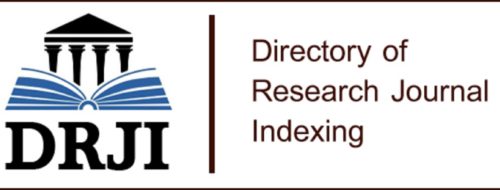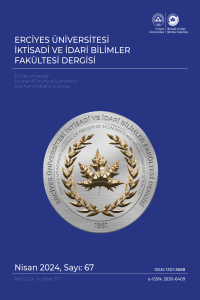THE EFFECT OF ORGANIZATIONAL JUSTICE PERCEPTION ON EMPLOYEES' PROSOCIAL SERVICE BEHAVIORS: A RESEARCH ON BANK EMPLOYEES
Abstract
This study emerged on the questions “Does the perception of organizational justice effect the prosocial service behaviors of the employees?” and “Do organizational justice perceptions and prosocial work behaviors meet on a theoretical basis?”; a quantitative and empirical study built on the theories of equality, social exchange, and norm of reciprocity. From this point of view, it is aimed to determine the effect of organizational justice perceptions of employees on prosocial service behaviors. In this direction, a research was conducted on bank employees operating in Konya. Convenience sampling method was chosen within the scope of the research and survey method was used as data collection tool. The data obtained from 452 questionnaires were analyzed with “SPSS 29 and AMOS 24 programs.” As a result of the research it was determined that, the positive and statistically significant effect of the perception of interactional justice on prosocial service behavior towards customers and prosocial service behavior towards colleagues; the perception of distributive justice had a negative and statistically significant effect on the prosocial service behavior towards co-workers. It is thought that the results contribute to the literature has been made and a discussion environment has been created for similar studies to be conducted in the future.
Keywords
Organizational justice Organizational justice perception Prosocial behaviors Prosocial service behaviors
References
- Ackfeldt, A.L. ve Wong, V. (2006). The antecedents of prosocial service behaviours: An empirical investigation. The Service Industries Journal, 26 (7), 727-745.
- Akgündüz, Y. (2021). Örgütsel davranış teorileri. Ankara: Nobel Yayıncılık.
- Altunışık, R., Coşkun, R., Bayraktaroğlu, S. ve Yıldırım, E. (2012). Sosyal bilimlerde araştırma yöntemleri: SPSS uygulamalı. 4. Baskı, İstanbul: Avcı Ofset.
- Ambrose, M.L. ve Arnaud, A. (2005). Are procedural justice and distributive justice conceptually distinct? (ed.) Greenberg, J. ve Colquitt, J.A. içinde, Handbook of Organizational Justice. ABD: Lawrence Erlbaum.
- Ateş, M.F. (2017). Sosyal mübadele teorisi. (ed.) Turunç, Ö. ve Turgut, H. içinde, Yönetim ve strateji 101 teori ve yaklaşım, Ankara: Siyasal Kitabevi.
- Basirun M., Haryono S., Mustofa Z. ve Prajoogo W. (2022). The influence of organizational justice and prosocial behavior toward empathy on the care of islamic religious patients with welfare moderators. Macedonian Journal of Medical Sciences, 10 (E), 926-932.
- Bettencourt, L. A. ve Brown, S.W. (2003). Role stressors and customer-oriented boundary- spanning behaviors in service organizations. Journal of the Academy of Marketing Science, 31(4), 394-408.
- Bettencourt, L.A. ve Brown, S.W. (1997). Contact employees: Relationships among workplace fairness, job satisfaction and prosocial service behaviors. Journal of Retailing, 73 (1), 39-61.
- Beugré, C. D. (2002). Understanding organizational justice and its impact on managing employees: An African perspective. The International Journal of Human Resource Management, 13 (7), 1091-1104.
- Boundenghan, M., Desrumaux, P., Léoni, V. ve Nicolas, C.V. (2012). Predicting prosocial behavior in the workplace: Links with organizational justice, commitment, affectivity, and personality. Revue Internationale de Psychologie Sociale, 25 (3-4), 13-38.
- Brief, A.P. ve Motowidlo, S.J. (1986). Prosocial organizational behaviors. Academy of Management Review, 11 (4), 710-725.
- Büyüköztürk, Ş. (2002). Sosyal bilimler için veri analiz el kitabı. Ankara: Pegem Yayıncılık.
- Chegini, M.G. (2009). The relationship between organizational justice and organizational citizenship behavior. American Journal of Economics and Business Administration, 1 (2), 173-176.
- Colqulitt, J.A., Greenberg, J. ve Zapata-Phelan, C.P. (2005). What is organizational justice? A historical overview. (ed.) Greenberg, J. ve Colquitt, J.A. içinde, Handbook of organizational justice. ABD: Lawrence Erlbaum.
- Curun, F. (2021). Sosyal mübadele kuramları. (ed.) Bulut, M.B. içinde, Sosyal psikoloji kuramları-I, Ankara: Nobel Yayıncılık.
- Çakır, Ö. (2006). Ücret adaletinin iş davranışları üzerindeki etkileri. Kamu-İş Kamu İşletmeleri İşverenleri Sendikası, Ankara.
- Çoklar Okutkan, I. (2021). Adalete duyarlılık kuramı. (ed.) Bulut, M.B. içinde, Sosyal psikoloji kuramları-I, Ankara: Nobel Yayıncılık.
- Çolak, M. ve Erdost, H.E. (2004). Organizational justice: A review of the literature and some suggestions for future research. Hacettepe Üniversitesi İktisadi ve İdari Bilimler Fakültesi Dergisi, 22 (2), 51-84.
- Demirel, Y. ve Dinçer, E. (2011). Örgütsel adalet. (ed.). Bedük, A. içinde, Örgüt psikolojisi, Konya, Atlas Akademi.
- Doğan, A. ve Varoğlu, A. (2016). Eşitlik kuramı. (ed.) Yürür, S. içinde, Örgütsel davranış kuramları. İstanbul: Beta.
- Doğan, H. (2002). İşgörenlerin adalet algılamalarında örgüt içi iletişim ve prosedürel bilgilendirmenin rolü. Ege Akademik Bakış Dergisi, 2 (2), 71-78.
- Eagly, A.H. (2009). The his and hers of prosocial behavior: An examination of the social psychology of gender. American Psychologist, 64 (8), 644-658.
- Fornell, C. ve Larcker, D. F. (1981). Evaluating structural equation models with unobservable variables and measurement error. Journal of Marketing Research, 18 (1), 39-50.
- George, J.M. (1991). State or trait: Effects of positive mood on prosocial behaviors at work. Journal of Applied Psychology, 76 (2), 299-307.
- George, J.M., ve Bettenhausen, K. (1990). Understanding prosocial behavior, sales performance and turnover: A group-level analysis in a service context. Journal of Applied Psychology, 75, 698- 709.
- Gollwitzer, M., Rothmund, T., Pfeiffer, A. ve Ensenbach, C. (2009). Why and when justice sensitivity leads to pro- and antisocial behavior. Journal of Research in Personality, 43 (6), 999-1005.
- Greenberg, J. (1982). Approaching equity and avoiding inequity in groups and organizations. (ed.) Greenberg, J. ve Cohen, R.L. içinde, Equity and justice in social behavior. New York: Academic Press.
- Greenberg, J. (1987). A Taxonomy of Organizational Justice Theories. Academy of Management Review, 12 (1), 9-22.
- Greenberg, J. (1990). Organizational justice: yesterday, today, and tomorrow. Journal of Management, 16 (2), 399-432.
- Gürbüz, S. ve Mert, İ.S. (2009). Örgütsel adalet ölçeğinin geçerlilik ve güvenilirlik uygulaması: Kamuda görgül bir çalışma. Amme İdaresi Dergisi, 42 (3), 117-139.
- Gürbüz, S. ve Şahin, F. (2018). Sosyal bilimlerde araştırma yöntemleri. Ankara: Seçkin Yayıncılık.
- Hair, J.F., Black, W.C., Babin, B.J. ve Anderson, R.E. (2019). Multivariate data analysis (8th ed.). United Kingdom: Cengage Learning EMEA.
- Huck, S. W. (2012). Reading statistics and research. Boston: Pearson.
- Hunt, M. (1990). The compassionate beast. New York: William Morrow.
- İçerli, L. (2010). Örgütsel adalet: Kuramsal bir yaklaşım. Girişimcilik ve Kalkınma Dergisi, 5 (1), 67-92.
- İpek, M. (2014). Prososyal davranışta liderlik tarzının rolü: milletvekili-danışman ilişkisi üzerine bir araştırma. Türk Hava Kurumu Üniversitesi Sosyal Bilimler Enstitüsü, Yüksek Lisans Tezi, Ankara.
- İyigün, N.Ö. (2012). Örgütsel adalet: Kuramsal bir yaklaşım. İstanbul Ticaret Üniversitesi Sosyal Bilimler Dergisi, 11 (21), 49-64.
- Kalaycı, Ş. (2005). SPSS uygulamalı çok değişkenli istatistik teknikleri. Ankara: Asil Yayınevi.
- Kelley, S. (1997). An investigation of positive affect, prosocial behaviors and service quality. Journal of Retailing, 73 (3), 407-427.
- Khine, M.S. (2013). Application of structural equation modeling in educational research and practice. Rotterdam: Sense Publishers.
- Kim, J. H. (2019). Multicollinearity and misleading statistical results. Korean Journal of Anesthesiology, 72 (6), 558-569.
- Kim, Y. ve Jang, S.J. (2018). Nurses' organizational communication satisfaction, emotional labor, and prosocial service behavior: A cross-sectional study. Nursing and Health Sciences, 21, 223-230.
- Knoche, H.T. ve Waples, P. (2016). A process model of prosocial behavior: The interaction of emotion and the need for justice. Journal of Management & Organization, 22 (1), 96-112.
- Lee, C. (1995). Prosocial organizational behaviors: The roles of workplace justice, achievement striving, and pay satisfaction. Journal of Business and Psychology, 10 (2), 197-206.
- Leventhal, G.S. (1980). Whatshould be done with equity theory? (ed.) Gergen, K.J., Greenberg, M.S. ve Willis, R.H. içinde, Social exchange: Advances in theory and research. New York: Plenum.
- Menard, S. (2002). Applied logistic regression analysis. Thousand Oaks CA: Sage Publications.
- Merriam - Webster Dictionaries (2022). “Justice” https://www.merriam-webster.com/dictionary/justice Erişim Tarihi: 1.8.2022.
- Meydan, C.H. ve Şeşen, H. (2015). Yapısal eşitlik modellemesi AMOS uygulamaları. Ankara: Detay Yayıncılık.
- Montada, L. ve Schneider, A. (1991). Justice and prosocial commitments. (ed.) Bierhoff, H.W. içinde, Altruism in social systems. Toronto: Hogrefe and Huber.
- Moorman, R.H. (1991). Relationship between organizational justice and organizational citizenship behaviors: Do fairness perceptions influence employee citizenship? Journal of Applied Psychology, 76, 845-855.
- Niehoff, B.P. ve Moorman, R.H. (1993). Justice as a mediator of the relationship between methods of monitoring and organizational citizenship behavior. Academy of Management Journal, 36 (3), 527-556.
- Organ, D.W. (1988). A restatement of the satisfaction-performance hypothesis. Journal of Management, 14, 547-557.
- Organ, D.W. ve Konovsky, M.A. (1989). Cognitive versus affective determinants of organizational citizenship behavior. Journal of Applied Psychology, 74, 157-164.
- Organ, D.W. ve Moorman, R.H. (1993). Fairness and organizational citizenship behavior: What are the connections? Social Justice Research, 6, 5-18.
- Podsakoff, N.P., Whiting, S.W., Podsakoff, P.M. ve Blume, B.D. (2009). Individual- and organizational-level consequences of organizational citizenship behaviors: A meta-analysis. Journal of Applied Psychology, 9 (1), 122-144.
- Sağır, A. (2016). Örgütsel adalet kuramı. (ed.) Polat, M. ve Arun, K. içinde, Yönetim ve organizasyon kuramları. Ankara: Nobel Yayıncılık. Schmitt, M., Neumann, R. ve Montada, L. (1995). Dispositional sensitivity to befallen injustice. Social Justice Research, 8 (4), 385-407.
- Schumacker, R.E. ve Lomax, R.G. (2010). A beginner’s guide to structural equation modeling. New York: Taylor and Francis.
- Seçer, İ. (2017). SPSS ve LISREL ile pratik veri analizi. Ankara: Anı Yayıncılık.
- Sekaran, U. (2003). Research methods for business: A Skill building approach. 4th Edition, New York: John Wiley & Sons Inc.
- Simon, D., Kriston, L., Loh, A., Spies, C., Scheibler, F., Wills, C. ve Härter, M. (2010). Confirmatory factor analysis and recommendations for improvement of the autonomy‐preference‐index (API). Health Expectations, 13 (3), 234-243.
- Sipahi, B., Yurtkoru, E.S. ve Çinko, M. (2008). Sosyal bilimlerde SPSS’le veri analizi. İstanbul: Beta Basım Yayım Dağıtım.
- Soydemir, S., Özdaşlı, K. ve Alparslan, M.A. (2014). Görev-insan odaklı liderlik algılamasının vatandaşa yönelik prososyal hizmet davranışlarına etkisi: Kolluk kuvvetleri üzerine bir araştırma. AKÜ İİBF Dergisi, 16 (2), 63-81.
- Sucu, M. (2020). Pandemi döneminde sağlık çalışanlarının duygusal zekâ durumları ile prososyal davranışları arasındaki ilişkiyi incelemeye yönelik bir araştırma. Yönetim Bilimleri Dergisi, 19 (41), 665-698.
- Tabachnick, B.G. ve Fidell, L.S. (2018). Using multivariate statistics. New York: Pearson.
- Thibaut. J. ve Walker, L.(1978). A theory of procedure. California Laio Review, 66, 541-566.
- Thornton, M.A., ve Rupp, D.E. (2016). The joint effects of justice climate, group moral identity, and corporate social responsibility on the prosocial and deviant behaviors of groups. Journal of Business Ethics, 137 (4), 677-697.
- Türk Dil Kurumu - TDK (2022). “Adalet” https://sozluk.gov.tr/ Erişim Tarihi: 1.8.2022.
- Türkiye Bankalar Birliği https://verisistemi.tbb.org.tr/index.php?/tbb/report_bolgeler, Erişim Tarihi: 10.11.2022
- Ulukapı, H. ve Bedük, A. (2013). Örgütsel adaletin işgörenlerin bağlılık düzeyleri üzerine etkisi: Konya’da bir araştırma. Uluslararası Sosyal Araştırmalar Dergisi, 7 (31), 771-778.
- Van Avermaet, E., McClintock, C. ve Moskowitz, J. (1978). Alternative approaches to equity: Dissonance reduction, pro-social motivation and strategies accommodation. European Journal of Social Psychology, 8, 419-437.
- White, K., Habib, R. ve Dahl, D.W. (2019). A review and framework for thinking about the drivers of prosocial consumer behavior. JACR, 5 (1), 2-18.
- Wintericht, K.P., Aquino, K., Mittal, V. ve Swartz, R. (2013). When moral identity symbolization motivates Prosocial behavior: The role of recognition and moral identity internalization. Journal of Applied Psychology, 98 (5), 759-770.
- Yean, T.F. ve Yusof, A.A. (2016). Organizational justice: A conceptional discussion. Procedia - Social and Behavioral Sciences, 219, 798-803.
- Yeşiltaş, M., Kanten, P. ve Sormaz, Ü. (2013). Otantik liderlik tarzının prososyal hizmet davranışları üzerindeki etkisi: Konaklama işletmelerine yönelik bir uygulama. İstanbul Üniversitesi İşletme Fakültesi Dergisi 42 (2), 333-350.
- Yürür, S. (2016). Sosyal mübadele kuramı. (ed.) Yürür, S. içinde, Örgütsel davranış kuramları. İstanbul: Beta.
ÖRGÜTSEL ADALET ALGISININ ÇALIŞANLARIN PROSOSYAL HİZMET DAVRANIŞLARI ÜZERİNDEKİ ETKİSİ: BANKA ÇALIŞANLARI ÜZERİNE BİR ARAŞTIRMA
Abstract
Bu çalışma, “Örgütsel adalet algısı, çalışanların prososyal hizmet davranışlarını etkilemekte midir?” ve “Örgütsel adalet algısı ile prososyal hizmet davranışları kuramsal bir temelde buluşmakta mıdır?” soruları üzerine ortaya çıkmış olup; eşitlik, sosyal mübadele ve karşılıklı norm kuramları temelinde inşa edilmiş, nicel ve görgül bir çalışmadır. Çalışma ile çalışanların örgütsel adalet algılarının prososyal hizmet davranışları üzerindeki etkisinin tespit edilmesi amaçlanmıştır. Bu doğrultuda Konya ilinde faaliyet gösteren banka çalışanları üzerinde bir araştırma yapılmıştır. Araştırma kapsamında kolayda örnekleme yöntemi seçilmiş olup veri toplama aracı olarak anket yöntemi kullanılmıştır. Geri dönüşü gerçekleşen 452 anketten elde edilen veriler “SPSS 29 ve AMOS 24 programları” ile analiz edilmiştir. Araştırma sonucunda etkileşim adaleti algısının müşterilere yönelik prososyal hizmet davranışı ve çalışma arkadaşlarına yönelik prososyal hizmet davranışı üzerinde pozitif ve istatistiksel bakımdan anlamlı etkisinin; dağıtım adaleti algısının ise çalışma arkadaşlarına yönelik prososyal hizmet davranışı üzerinde negatif ve istatistiksel bakımdan anlamlı etkisinin olduğu tespit edilmiştir. Elde edilen sonuçlar ile literatüre katkı sunulduğu ve ileride yapılacak benzer araştırmalar için tartışma ortamı yaratıldığı düşünülmektedir.
References
- Ackfeldt, A.L. ve Wong, V. (2006). The antecedents of prosocial service behaviours: An empirical investigation. The Service Industries Journal, 26 (7), 727-745.
- Akgündüz, Y. (2021). Örgütsel davranış teorileri. Ankara: Nobel Yayıncılık.
- Altunışık, R., Coşkun, R., Bayraktaroğlu, S. ve Yıldırım, E. (2012). Sosyal bilimlerde araştırma yöntemleri: SPSS uygulamalı. 4. Baskı, İstanbul: Avcı Ofset.
- Ambrose, M.L. ve Arnaud, A. (2005). Are procedural justice and distributive justice conceptually distinct? (ed.) Greenberg, J. ve Colquitt, J.A. içinde, Handbook of Organizational Justice. ABD: Lawrence Erlbaum.
- Ateş, M.F. (2017). Sosyal mübadele teorisi. (ed.) Turunç, Ö. ve Turgut, H. içinde, Yönetim ve strateji 101 teori ve yaklaşım, Ankara: Siyasal Kitabevi.
- Basirun M., Haryono S., Mustofa Z. ve Prajoogo W. (2022). The influence of organizational justice and prosocial behavior toward empathy on the care of islamic religious patients with welfare moderators. Macedonian Journal of Medical Sciences, 10 (E), 926-932.
- Bettencourt, L. A. ve Brown, S.W. (2003). Role stressors and customer-oriented boundary- spanning behaviors in service organizations. Journal of the Academy of Marketing Science, 31(4), 394-408.
- Bettencourt, L.A. ve Brown, S.W. (1997). Contact employees: Relationships among workplace fairness, job satisfaction and prosocial service behaviors. Journal of Retailing, 73 (1), 39-61.
- Beugré, C. D. (2002). Understanding organizational justice and its impact on managing employees: An African perspective. The International Journal of Human Resource Management, 13 (7), 1091-1104.
- Boundenghan, M., Desrumaux, P., Léoni, V. ve Nicolas, C.V. (2012). Predicting prosocial behavior in the workplace: Links with organizational justice, commitment, affectivity, and personality. Revue Internationale de Psychologie Sociale, 25 (3-4), 13-38.
- Brief, A.P. ve Motowidlo, S.J. (1986). Prosocial organizational behaviors. Academy of Management Review, 11 (4), 710-725.
- Büyüköztürk, Ş. (2002). Sosyal bilimler için veri analiz el kitabı. Ankara: Pegem Yayıncılık.
- Chegini, M.G. (2009). The relationship between organizational justice and organizational citizenship behavior. American Journal of Economics and Business Administration, 1 (2), 173-176.
- Colqulitt, J.A., Greenberg, J. ve Zapata-Phelan, C.P. (2005). What is organizational justice? A historical overview. (ed.) Greenberg, J. ve Colquitt, J.A. içinde, Handbook of organizational justice. ABD: Lawrence Erlbaum.
- Curun, F. (2021). Sosyal mübadele kuramları. (ed.) Bulut, M.B. içinde, Sosyal psikoloji kuramları-I, Ankara: Nobel Yayıncılık.
- Çakır, Ö. (2006). Ücret adaletinin iş davranışları üzerindeki etkileri. Kamu-İş Kamu İşletmeleri İşverenleri Sendikası, Ankara.
- Çoklar Okutkan, I. (2021). Adalete duyarlılık kuramı. (ed.) Bulut, M.B. içinde, Sosyal psikoloji kuramları-I, Ankara: Nobel Yayıncılık.
- Çolak, M. ve Erdost, H.E. (2004). Organizational justice: A review of the literature and some suggestions for future research. Hacettepe Üniversitesi İktisadi ve İdari Bilimler Fakültesi Dergisi, 22 (2), 51-84.
- Demirel, Y. ve Dinçer, E. (2011). Örgütsel adalet. (ed.). Bedük, A. içinde, Örgüt psikolojisi, Konya, Atlas Akademi.
- Doğan, A. ve Varoğlu, A. (2016). Eşitlik kuramı. (ed.) Yürür, S. içinde, Örgütsel davranış kuramları. İstanbul: Beta.
- Doğan, H. (2002). İşgörenlerin adalet algılamalarında örgüt içi iletişim ve prosedürel bilgilendirmenin rolü. Ege Akademik Bakış Dergisi, 2 (2), 71-78.
- Eagly, A.H. (2009). The his and hers of prosocial behavior: An examination of the social psychology of gender. American Psychologist, 64 (8), 644-658.
- Fornell, C. ve Larcker, D. F. (1981). Evaluating structural equation models with unobservable variables and measurement error. Journal of Marketing Research, 18 (1), 39-50.
- George, J.M. (1991). State or trait: Effects of positive mood on prosocial behaviors at work. Journal of Applied Psychology, 76 (2), 299-307.
- George, J.M., ve Bettenhausen, K. (1990). Understanding prosocial behavior, sales performance and turnover: A group-level analysis in a service context. Journal of Applied Psychology, 75, 698- 709.
- Gollwitzer, M., Rothmund, T., Pfeiffer, A. ve Ensenbach, C. (2009). Why and when justice sensitivity leads to pro- and antisocial behavior. Journal of Research in Personality, 43 (6), 999-1005.
- Greenberg, J. (1982). Approaching equity and avoiding inequity in groups and organizations. (ed.) Greenberg, J. ve Cohen, R.L. içinde, Equity and justice in social behavior. New York: Academic Press.
- Greenberg, J. (1987). A Taxonomy of Organizational Justice Theories. Academy of Management Review, 12 (1), 9-22.
- Greenberg, J. (1990). Organizational justice: yesterday, today, and tomorrow. Journal of Management, 16 (2), 399-432.
- Gürbüz, S. ve Mert, İ.S. (2009). Örgütsel adalet ölçeğinin geçerlilik ve güvenilirlik uygulaması: Kamuda görgül bir çalışma. Amme İdaresi Dergisi, 42 (3), 117-139.
- Gürbüz, S. ve Şahin, F. (2018). Sosyal bilimlerde araştırma yöntemleri. Ankara: Seçkin Yayıncılık.
- Hair, J.F., Black, W.C., Babin, B.J. ve Anderson, R.E. (2019). Multivariate data analysis (8th ed.). United Kingdom: Cengage Learning EMEA.
- Huck, S. W. (2012). Reading statistics and research. Boston: Pearson.
- Hunt, M. (1990). The compassionate beast. New York: William Morrow.
- İçerli, L. (2010). Örgütsel adalet: Kuramsal bir yaklaşım. Girişimcilik ve Kalkınma Dergisi, 5 (1), 67-92.
- İpek, M. (2014). Prososyal davranışta liderlik tarzının rolü: milletvekili-danışman ilişkisi üzerine bir araştırma. Türk Hava Kurumu Üniversitesi Sosyal Bilimler Enstitüsü, Yüksek Lisans Tezi, Ankara.
- İyigün, N.Ö. (2012). Örgütsel adalet: Kuramsal bir yaklaşım. İstanbul Ticaret Üniversitesi Sosyal Bilimler Dergisi, 11 (21), 49-64.
- Kalaycı, Ş. (2005). SPSS uygulamalı çok değişkenli istatistik teknikleri. Ankara: Asil Yayınevi.
- Kelley, S. (1997). An investigation of positive affect, prosocial behaviors and service quality. Journal of Retailing, 73 (3), 407-427.
- Khine, M.S. (2013). Application of structural equation modeling in educational research and practice. Rotterdam: Sense Publishers.
- Kim, J. H. (2019). Multicollinearity and misleading statistical results. Korean Journal of Anesthesiology, 72 (6), 558-569.
- Kim, Y. ve Jang, S.J. (2018). Nurses' organizational communication satisfaction, emotional labor, and prosocial service behavior: A cross-sectional study. Nursing and Health Sciences, 21, 223-230.
- Knoche, H.T. ve Waples, P. (2016). A process model of prosocial behavior: The interaction of emotion and the need for justice. Journal of Management & Organization, 22 (1), 96-112.
- Lee, C. (1995). Prosocial organizational behaviors: The roles of workplace justice, achievement striving, and pay satisfaction. Journal of Business and Psychology, 10 (2), 197-206.
- Leventhal, G.S. (1980). Whatshould be done with equity theory? (ed.) Gergen, K.J., Greenberg, M.S. ve Willis, R.H. içinde, Social exchange: Advances in theory and research. New York: Plenum.
- Menard, S. (2002). Applied logistic regression analysis. Thousand Oaks CA: Sage Publications.
- Merriam - Webster Dictionaries (2022). “Justice” https://www.merriam-webster.com/dictionary/justice Erişim Tarihi: 1.8.2022.
- Meydan, C.H. ve Şeşen, H. (2015). Yapısal eşitlik modellemesi AMOS uygulamaları. Ankara: Detay Yayıncılık.
- Montada, L. ve Schneider, A. (1991). Justice and prosocial commitments. (ed.) Bierhoff, H.W. içinde, Altruism in social systems. Toronto: Hogrefe and Huber.
- Moorman, R.H. (1991). Relationship between organizational justice and organizational citizenship behaviors: Do fairness perceptions influence employee citizenship? Journal of Applied Psychology, 76, 845-855.
- Niehoff, B.P. ve Moorman, R.H. (1993). Justice as a mediator of the relationship between methods of monitoring and organizational citizenship behavior. Academy of Management Journal, 36 (3), 527-556.
- Organ, D.W. (1988). A restatement of the satisfaction-performance hypothesis. Journal of Management, 14, 547-557.
- Organ, D.W. ve Konovsky, M.A. (1989). Cognitive versus affective determinants of organizational citizenship behavior. Journal of Applied Psychology, 74, 157-164.
- Organ, D.W. ve Moorman, R.H. (1993). Fairness and organizational citizenship behavior: What are the connections? Social Justice Research, 6, 5-18.
- Podsakoff, N.P., Whiting, S.W., Podsakoff, P.M. ve Blume, B.D. (2009). Individual- and organizational-level consequences of organizational citizenship behaviors: A meta-analysis. Journal of Applied Psychology, 9 (1), 122-144.
- Sağır, A. (2016). Örgütsel adalet kuramı. (ed.) Polat, M. ve Arun, K. içinde, Yönetim ve organizasyon kuramları. Ankara: Nobel Yayıncılık. Schmitt, M., Neumann, R. ve Montada, L. (1995). Dispositional sensitivity to befallen injustice. Social Justice Research, 8 (4), 385-407.
- Schumacker, R.E. ve Lomax, R.G. (2010). A beginner’s guide to structural equation modeling. New York: Taylor and Francis.
- Seçer, İ. (2017). SPSS ve LISREL ile pratik veri analizi. Ankara: Anı Yayıncılık.
- Sekaran, U. (2003). Research methods for business: A Skill building approach. 4th Edition, New York: John Wiley & Sons Inc.
- Simon, D., Kriston, L., Loh, A., Spies, C., Scheibler, F., Wills, C. ve Härter, M. (2010). Confirmatory factor analysis and recommendations for improvement of the autonomy‐preference‐index (API). Health Expectations, 13 (3), 234-243.
- Sipahi, B., Yurtkoru, E.S. ve Çinko, M. (2008). Sosyal bilimlerde SPSS’le veri analizi. İstanbul: Beta Basım Yayım Dağıtım.
- Soydemir, S., Özdaşlı, K. ve Alparslan, M.A. (2014). Görev-insan odaklı liderlik algılamasının vatandaşa yönelik prososyal hizmet davranışlarına etkisi: Kolluk kuvvetleri üzerine bir araştırma. AKÜ İİBF Dergisi, 16 (2), 63-81.
- Sucu, M. (2020). Pandemi döneminde sağlık çalışanlarının duygusal zekâ durumları ile prososyal davranışları arasındaki ilişkiyi incelemeye yönelik bir araştırma. Yönetim Bilimleri Dergisi, 19 (41), 665-698.
- Tabachnick, B.G. ve Fidell, L.S. (2018). Using multivariate statistics. New York: Pearson.
- Thibaut. J. ve Walker, L.(1978). A theory of procedure. California Laio Review, 66, 541-566.
- Thornton, M.A., ve Rupp, D.E. (2016). The joint effects of justice climate, group moral identity, and corporate social responsibility on the prosocial and deviant behaviors of groups. Journal of Business Ethics, 137 (4), 677-697.
- Türk Dil Kurumu - TDK (2022). “Adalet” https://sozluk.gov.tr/ Erişim Tarihi: 1.8.2022.
- Türkiye Bankalar Birliği https://verisistemi.tbb.org.tr/index.php?/tbb/report_bolgeler, Erişim Tarihi: 10.11.2022
- Ulukapı, H. ve Bedük, A. (2013). Örgütsel adaletin işgörenlerin bağlılık düzeyleri üzerine etkisi: Konya’da bir araştırma. Uluslararası Sosyal Araştırmalar Dergisi, 7 (31), 771-778.
- Van Avermaet, E., McClintock, C. ve Moskowitz, J. (1978). Alternative approaches to equity: Dissonance reduction, pro-social motivation and strategies accommodation. European Journal of Social Psychology, 8, 419-437.
- White, K., Habib, R. ve Dahl, D.W. (2019). A review and framework for thinking about the drivers of prosocial consumer behavior. JACR, 5 (1), 2-18.
- Wintericht, K.P., Aquino, K., Mittal, V. ve Swartz, R. (2013). When moral identity symbolization motivates Prosocial behavior: The role of recognition and moral identity internalization. Journal of Applied Psychology, 98 (5), 759-770.
- Yean, T.F. ve Yusof, A.A. (2016). Organizational justice: A conceptional discussion. Procedia - Social and Behavioral Sciences, 219, 798-803.
- Yeşiltaş, M., Kanten, P. ve Sormaz, Ü. (2013). Otantik liderlik tarzının prososyal hizmet davranışları üzerindeki etkisi: Konaklama işletmelerine yönelik bir uygulama. İstanbul Üniversitesi İşletme Fakültesi Dergisi 42 (2), 333-350.
- Yürür, S. (2016). Sosyal mübadele kuramı. (ed.) Yürür, S. içinde, Örgütsel davranış kuramları. İstanbul: Beta.
Details
| Primary Language | Turkish |
|---|---|
| Subjects | Human Resources and Industrial Relations (Other), Business Administration |
| Journal Section | Makaleler |
| Authors | |
| Early Pub Date | April 28, 2024 |
| Publication Date | April 30, 2024 |
| Acceptance Date | November 23, 2023 |
| Published in Issue | Year 2024 Issue: 67 |













ERÜ İktisadi ve İdari Bilimler Fakültesi Dergisi 2021 | iibfdergi@erciyes.edu.tr
Bu eser Creative Commons Atıf-Gayri Ticari-Türetilemez 4.0 Uluslararası Lisansı ile lisanslanmıştır.



